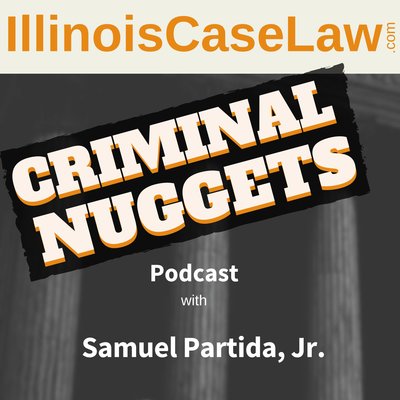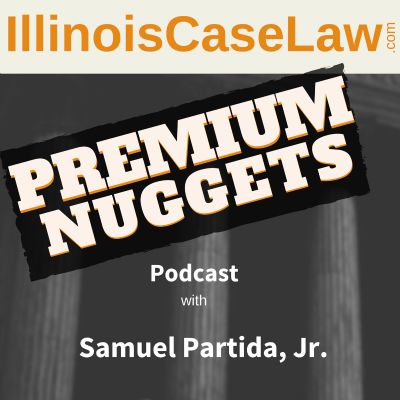Sep 2, 2018
An expert witness new foundational element is being implemented by an Illinois appellate court. This is their way of dealing with unreliable expert testimony. See Committee on Identifying the Needs of the Forensic Sciences Community, National Research Council
Illinois courts are dealing with unreliable expert witness testimony by creating a new foundational element.
See People v. Jones, 2015 IL App (1st) 121016 (04/22/2015).

Subscribe:
iTunes | Android
| RSS
What is This Case About?
The defendant was convicted in a jury trial of first-degree murder based on circumstantial evidence. It was a close case with no eyewitnesses to the shooting. Defendant denied being the shooter. However, a gun was recovered from his home.
A bullet fell out of the victim’s body and and casings were recovered from the crime scene. A forensic scientist from the Illinois State Police laboratory specializing in firearms identification testified as an expert witness.
The firearm/toolmark examiner testified that the question of what is "sufficient agreement" between the items is based on his training and experience. ¶ 34. The expert testified that he does not use a national standard, and that examinations at the Illinois State Police laboratory are "just based on our training and experience, which is verified by another examiner," and that there is no Illinois State Police standard. ¶ 34.
The expert gave his opinion that there was sufficient agreement between the bullet recovered from the victim’s body and the test bullets fired from defendant's gun. Thus, the bullet recovered from the victim’s body was fired from defendant's gun.
Issue
Was there a sufficient foundation laid by the expert witness allowing him to establish a sufficient basis for the expert’s opinion testimony?
To begin to answer this question we must first look at the rules.
What Precisely Are the Rules on Admitting an Expert Witness?
Three Illinois Rules of Evidence are relevant here.
Let’s look at …
- Rule 702 Testimony by Experts
- Rule 703 Bases of Opinion Testimony by Experts
- Rule 705 Disclosure of Facts or Data Underlying Expert Opinion
Rule 702 Testimony by Experts
Rule 703 Bases of Opinion Testimony By Experts
Rule 705 Disclosure of Facts or Data
According to these rules, it is clear that a witness who has been qualified as an expert witness need not testify “to the underlying facts or data” on which the opinion is based upon. Rule 705. “The facts or data need not be admissible in evidence.” Rule 703.
Holding
However, the reviewing court in this case ruled that “all expert testimony, whether scientific or not, must have an adequate foundation in order to be admissible.” ¶ 54. “[T]he admission of an expert's testimony requires the proponent to lay an adequate foundation establishing that the information upon which the expert bases his opinion is reliable." ¶ 54 quoting People v. Safford, 392 Ill. App. 3d 212, 221 (2009).
The court held that:
This foundational requirement is required for the admission of all expert opinions. ¶ 54.
The appellate court then proceeded to overturn the murder conviction because the the testifying expert failed to explain the specific striations that he used to form his opinion. Thus, this expert failed to lay an adequate foundation.
So, if prosecutors have to start making sure to elicit the exact data points from the expert before the expert gives her opinion then this a rule the judges are creating from the case law.
Where Does it Come From?
Well, the reviewing court cited People v. Safford, 392 Ill. App. 3d 212, 221 (2009) (quoting Hiscott v. Peters, 324 Ill. App. 3d 114, 122 (2001), citing Soto v. Gaytan, 313 Ill. App. 3d 137, 146 (2000)) when it described this foundational element.
The appellate court also felt that “[p]art of the general foundation requirement for expert testimony is that 'it must be shown that the facts or data relied upon by the expert are of a type reasonably relied upon by [experts] in that particular field in forming opinions or inferences.” People v. Smith, 2012 IL App (1st) 102354, ¶ 70 (quoting People v. Contreras, 246 Ill. App. 3d 502, 510 (1993)).
The court saw this as an admissibility issue, not merely weight.
The court was acutely aware of the 2009 forensic science report that widely condemned many scientific procedures as being widely unreliable. See this report here.
Where It DID NOT Come From?
One thing is for sure. This “foundational” element for admission of an expert witness opinion is not in the rules.
As stated above, Rules 702, 703 and 705 do not require that the expert witness first explain what data is being relied upon to form the expert’s opinion. They rules say quite the opposite.
"Frye-Plus-Reliability"
The case that is often cited as the case establishing Illinois as a “Frye” state is Donaldson v. Central Illinois Public Service Co., 199 Ill.2d 63, 767 N.E.2d 314 (2002). Rule 702 itself refers to this case in the comments.
Remember, a Frye Hearing is required whenever scientific evidence is new or novel. This was not the issue in this case.
During the initial “Are we a Frye State Debate?” the idea of “Frye-plus-reliability” first came up. This was the idea that after a scientific technique or methodology is recognized as generally accepted, a trial court should still have to consider whether the opinion in the case is reliable.
On this issue, in 2002, the Illinois Supreme Court held that
Today, we clarify that this is not the standard in Illinois. The trial court is not required to conduct a two-part inquiry into both the reliability of the methodology and its general acceptance. The determination of the reliability of an expert's methodology is naturally subsumed by the inquiry into its general acceptance in the scientific community. Simply put, a principle or technique is not generally accepted in the scientific community if it is by nature unreliable. Additionally, the Frye-plus-reliability test impermissibly examines the data from which the opinion flows, while the technique remains generally accepted. Questions concerning underlying data, and an expert's application of generally accepted techniques, go to the weight of the evidence, rather than its admissibility. Donaldson, 199 Ill.2d at 81.
The Illinois Supreme Court Has More Than Just Rules on This Issue
The closest the Illinois Supreme has come to a foundational element for expert witnesses was in People v. McKown, 236 Ill.2d 278 (2010).
This is the case where the Court held that the “admissibility of HGN evidence in an individual case will depend on the State’s ability to lay a proper foundation and to demonstrate the qualification of its witness, subject to the balancing of probative value with the risk of unfair prejudice.” [emphasis added] McKnown, 236 Ill.2d at 314.
The Illinois Supreme Court did not even come close to creating a foundational element for expert witnesses.
Instead the Court:
- Tied he qualifications of the expert to how test is conducted
- HGN only admissible if NHTSA protocol is followed
- Only a properly trained officer could follow the protocol
- Opinion can only show consumption of alcohol
See McKnown, 236 Ill.2d at 306.
The court specifically held ”that evidence of HGN field-sobriety testing, when performed according to the NHTSA protocol by a properly trained officer, is admissible under the Frye test for the purpose of showing whether the subject has likely consumed alcohol and may be impaired.” 236 Ill.2d at 306.
The appellate court in the case at hand did not cite to McKnown for this principle.
Big Picture
The basic situation confronting the trial and appellate courts is this: They have to figure out what to do with scientific evidence that is not new nor novel yet for some reason deemed unreliable when applied to a specific case.
General Frye standards say the expert opinion is admissible if the expert is qualified. Under this rule, the defense is allowed to show jury the data points that the expert used to form their opinion.
That is what the line about letting it go to the weight but not the admissibility is all about.
This invented approach creates a new foundational element that takes into account the reliability of the evidence before allowing it to ever be seen by the jury.
This sounds like a "Frye-Plus-Reliability" standard but of course the court is not calling it that.
What They Should Have Done
McKnown hints at what the correct procedural pathway the court should have followed. The Court stated its ruling was "subject to the balancing of probative value with the risk of unfair prejudice.” McKnown, 236 Ill.2d at 314.
We know what that is. Its the 403 balancing we do in practically every case! See Rule 403 Exclusion of Relevant Evidence on Grounds of Prejudice, Confusion, or Waste of Time.
I know I looks like I want to a whole lot of trouble to point out an "error" in a case that I believe had the right outcome.
But I think the rules the matter.
List of Cases
- Donaldson v. Central Illinois Public Service Co., 199 Ill.2d 63, 767 N.E.2d 314 (2002)
- People v. McKown, 236 Ill.2d 278 (2010)
- People v. Safford, 392 Ill. App. 3d 212, 221 (2009)
- Soto v. Gaytan, 313 Ill. App. 3d 137 (2000)
- People v. Negron, 2012 IL App (1st) 101194 (2012)
- People v. Luna, 2013 IL App (1st) 072253 (04/13/20013)



